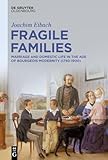Fragile Families : Marriage and Domestic Life in the Age of Bourgeois Modernity (1750-1900) / Joachim Eibach.
Material type: TextPublisher: München ; Wien : De Gruyter Oldenbourg, [2023]Copyright date: ©2023Description: 1 online resource (IX, 293 p.)Content type:
TextPublisher: München ; Wien : De Gruyter Oldenbourg, [2023]Copyright date: ©2023Description: 1 online resource (IX, 293 p.)Content type: - 9783111080888
- 9783111082158
- 9783111081700
- 306.85094
- online - DeGruyter
- Issued also in print.
| Item type | Current library | Call number | URL | Status | Notes | Barcode | |
|---|---|---|---|---|---|---|---|
 eBook
eBook
|
Biblioteca "Angelicum" Pont. Univ. S.Tommaso d'Aquino Nuvola online | online - DeGruyter (Browse shelf(Opens below)) | Online access | Not for loan (Accesso limitato) | Accesso per gli utenti autorizzati / Access for authorized users | (dgr)9783111081700 |
Browsing Biblioteca "Angelicum" Pont. Univ. S.Tommaso d'Aquino shelves, Shelving location: Nuvola online Close shelf browser (Hides shelf browser)
Frontmatter -- Acknowledgements -- Contents -- Chapter 1 Fragile Families? Stylish Staging and Everyday Disorder -- Chapter 2 Research and Sources -- Chapter 3 Love and a House of His Own: The Peasant Ulrich Bräker Seeks a Wife -- Chapter 4 Pious Everyday Life in the Bailiwick and the Patrician Milieu: Henriette Stettler-Herport -- Chapter 5 Bourgeois Marriage and Open Domesticity: Ferdinand and Caroline Beneke -- Chapter 6 The Parsonage as Labyrinth: Ursula and Abraham Bruckner-Eglinger -- Chapter 7 A Traveling Journeyman’s Home: Friedrich Anton Püschmann -- Chapter 8 Marital Crisis and Social Decline Among the Petite Bourgeoisie: Barbara and Johann Baumgartner -- Chapter 9 Growing Up Among the Proletariat: Friedrich Engels’ Report and Adelheid Popp -- Chapter 10 From a Bourgeois Family to an Artists’ Marriage: Paula Becker and Otto Modersohn -- Chapter 11 The Family: Decline or Resilience? -- List of Figures -- Bibliography -- Index of Persons -- Index of Subjects
restricted access online access with authorization star
http://purl.org/coar/access_right/c_16ec
In the era of bourgeois modernity (1750–1900), the family is as valued as it is vulnerable. It constitutes a community of care, conflict, and emotion. Time and again, it is evoked as a bond of love as well as a moral institution. Yet both love and morality are fragile. A more detailed exploration reveals that domestic life during this period was much more colorful, open, and dynamic – and also more prone to crisis – than one might expect given the vaunted view of the family that characterized the heyday of the bourgeoisie. This book rewrites the history of the modern family. Self-narratives – primarily diaries – written by members of eight families from Germany, Switzerland, and Austria serve as sources for this research. The focus extends far beyond the bourgeoisie. With a micro-historical eye, the author reconstructs family histories from the peasant milieu to the patrician elite, from the parsonage to the educated bourgeoisie; he considers the domestic life of a journeyman craftsman, a couple’s descent from the ranks of the petite bourgeoisie, the effects of an itinerant childhood among the proletariat, and the strain of being caught between a bourgeois family and artistic individuality. Many of these aspects point beyond bourgeois modernity to the family in our time.
Issued also in print.
Mode of access: Internet via World Wide Web.
In English.
Description based on online resource; title from PDF title page (publisher's Web site, viewed 26. Apr 2024)









